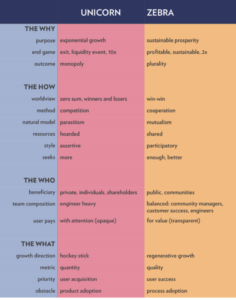The Great Tech Disconnects

How many times have we heard that the VC model is broken? Of course everyone is looking for a unicorn and the big pay-off, but considering the rate of failure of startups, are investors missing the forest though the trees?
That’s not the only disconnect. Again, pay attention.
We found an interesting piece from a few years back (2017) about investing in zebras (Zebras Fix What Unicorns Break), as opposed to unicorns which, let’s face it, are mythical creatures after all, while are zebras slow but steady growth companies that tend to solve real world problems, as opposed to a unicorn such as, for example, Google, which has created more problems for the world than it has solved. That sort of software isn’t eating the world, as Marc Andreessen once said: it’s more or less attempting to chew it up and spit it out.
Indie.vc was a fund that invested in these zebra/so-called ‘lifestyle’ companies, and it recently shut down, not because the companies were failing. In fact, as the Medium piece pointed out, eight companies received investment when the fund first launched. “Six years later, each of those initial 8 is still in business with many of them generating 7 and 8 figures in revenue.” But the LPs wanted faster ROIs, as do institutionals, and maybe it’s the investment structure that’s off. Maybe we need to rethink or reimagine ROI, especially with zebras, which in our opinion, are companies – yes, going there – of a different stripe that need to be nurtured differently. Or as OATV (O’Reilly AlphaTech Ventures, for which Indie.vc was a pilot project) managing director Bryce Roberts said in a piece from Yahoo News, “There needs to be something that sits in between banks and venture capital blitz.”
There are alternatives for such companies presently: crowdfunding and bank loans come to mind, but what we’ve noticed – and what we’ve heard from various investors who’ve spoken ‘virtually’ on different platforms, is that technology is still an industry that values youth. Which comes as no surprise, despite the fact that there’s Proof That The Most Successful Entrepreneurs Are Older Ones. So yet another disconnect and note to self: while Apple was founded when the founders were young (the company nearly went under; Steve Jobs was much more effective at the helm when he returned – and was over 40); the Google founders were just out of Stanford, but it was an older and more experienced person at the help (Eric Schmidt), who installed a business model. Still, it’s the fresh-out-of-school founders of the unicorn companies who stick in people’s – and investor’s – minds. Younger people may have the energy and the perceived extra years to figure it out/make it work (we did hear an investor mention this in a webinar), but do they have the stamina and the experience to know what they don’t know and thus contribute to ‘startup failure’ statistics?
The failure rate of startups is high:
- 90% of new startups fail.
- 75% of venture-backed startups fail.
- Under 50% of businesses make it to their fifth year.
- 33% of startups make it to the 10-year mark.
- Only 40% of startups actually turn a profit.
- 82% of businesses that fail do so because of cash flow problems.
- The highest failure rate occurs in the information industry (63%).
And note to self: IndieVC companies had a more difficult time getting to the next level not for lack of traction/growth, but rather for the lack of their ability to get follow on investment due to LPs looking for bigger payouts faster. It’s Casino Capitalism (a term coined by Tim O’Reilly, meaning the betting economy, in which wealthy people bet on which companies will win and which will lose): the high stakes rollers want to be in the invite-only room. Which doesn’t necessarily improve their chances of winning and may even be a case of au contraire, but big money went into Theranos, despite the fact that there wasn’t a single credentialed member of the medical or research community on the board and the Stanford drop out founder seem to be spending more time channeling Steve Jobs in press interviews than she did in the labs. Perception over diligence. Not exactly a winning scenario.
The companies aren’t necessarily failing – the VC model is. When it comes to the so-called lifestyle businesses, a different reimbursement-for-investment model needs to be put into place or to put it into industry terms: we’re way overdue for VCs to put their money literally where their mouths are and innovate. It may be more of a hybrid banking model after all but remember and speaking of Casino Capitalism: the house always wins. After all this time of the industry witnessing failed unicorn-hopefuls’ race to the bottom, lest we forget, it’s slow and steady that wins the race. Onward and forward.